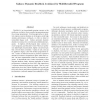Free Online Productivity Tools
i2Speak
i2Symbol
i2OCR
iTex2Img
iWeb2Print
iWeb2Shot
i2Type
iPdf2Split
iPdf2Merge
i2Bopomofo
i2Arabic
i2Style
i2Image
i2PDF
iLatex2Rtf
Sci2ools
116
click to vote
OSDI
2008
ACM
2008
ACM
Gadara: Dynamic Deadlock Avoidance for Multithreaded Programs
Deadlock is an increasingly pressing concern as the multicore revolution forces parallel programming upon the average programmer. Existing approaches to deadlock impose onerous burdens on developers, entail high runtime performance overheads, or offer no help for unmodified legacy code. Gadara automates dynamic deadlock avoidance for conventional multithreaded programs. It employs whole-program static analysis to model programs, and Discrete Control Theory to synthesize lightweight, decentralized, highly concurrent logic that controls them at runtime. Gadara is safe, and can be applied to legacy code with modest programmer effort. Gadara is efficient because it performs expensive deadlock-avoidance computations offline rather than online. We have implemented Gadara for C/Pthreads programs. In benchmark tests, Gadara successfully avoids injected deadlock faults, imposes negligible to modest performance overheads (at most 18%), and outperforms a software transactional memory system. Tes...
Impose Onerous Burdens | Multicore Revolution Forces | Operating System | OSDI 2008 | Performance Overheads |
Related Content
| Added | 03 Dec 2009 |
| Updated | 03 Dec 2009 |
| Type | Conference |
| Year | 2008 |
| Where | OSDI |
| Authors | Manjunath Kudlur, Scott A. Mahlke, Stéphane Lafortune, Terence Kelly, Yin Wang |
Comments (0)

